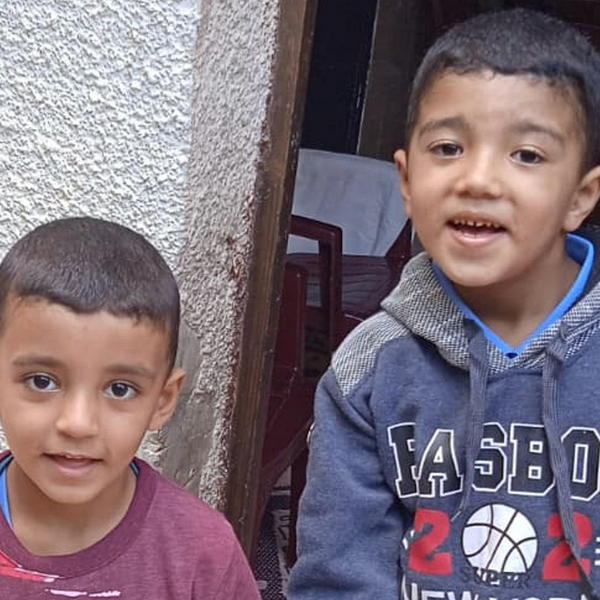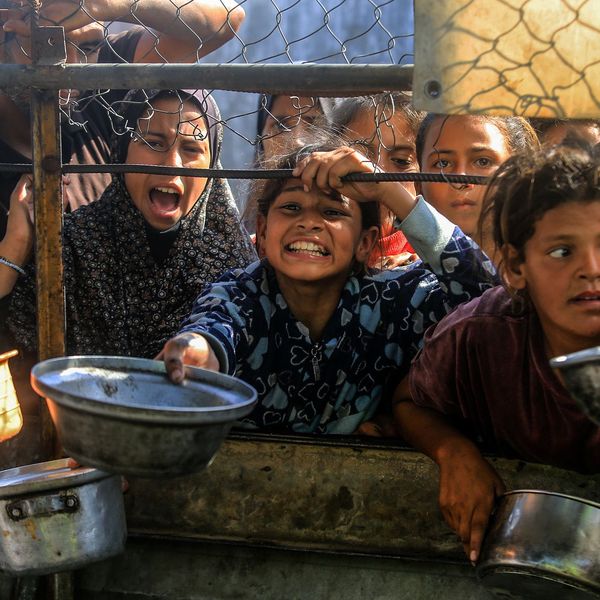Families Cannot Sue Firm for Israel Deaths
NEW YORK - The parents of Rachel Corrie, the US peace activist who was crushed to death four years ago in the then Israeli-occupied Gaza as she was protesting against the demolition of Palestinian homes, have been refused permission to sue the company which made the bulldozer that killed her.
On Monday a federal appeals court ruled that Caterpillar Inc, the Illinois-based company that has supplied several bulldozers used by the Israeli Defence Force (IDF) in house demolitions in the occupied territories, could not be sued as to do so would bring the judiciary into conflict with the executive branch of the US government.
A panel of three judges argued that the legal action could not have gone to trial "without implicitly questioning, and even condemning, United States foreign policy towards Israel".
Corrie was killed on March 16 2003 by a 60-tonne Caterpillar D9 bulldozer in Rafah, Gaza, as she was attempting to prevent the home of a Palestinian pharmacist being razed. She was wearing a fluorescent orange vest and according to witnesses in full view of the bulldozer operator.
Her parents, along with four Palestinian families left bereaved in actions involving similar bulldozers, began legal proceedings in 2005. Lawyers acting for the families alleged that Caterpillar had sold the machines to the Israeli government on a commercial basis. The firm knew, or should have known, that the equipment was going to be used to demolish homes in violation of international law in incidents that at times led to the deaths of innocent people, they said.
Caterpillar, with supporting evidence from the US government, argued that the machines had been paid for by the Pentagon as part of the government's military aid to Israel.
Cindy Corrie, Rachel's mother, told the Guardian that she was extremely disappointed by the court's decision. "Clearly there were war crimes committed here and we will continue to challenge Caterpillar and the US government."
Mariah LaHood, a lawyer with the Centre for Constitutional Rights who acted on the case, questioned the role the US government played in giving evidence favourable to Caterpillar. "Isn't there a responsibility to permit justice to be sought on behalf of a US citizen killed in a foreign country?"
Caterpillar said in a statement that it was pleased with the ruling. "We are hopeful it will bring to an end what has been a lengthy but fair judicial process."
Corrie's story received widespread attention at the time of her death. Her emails home describing her experiences as a peace activist in the run-up to her death were turned into a stage play, My Name is Rachel Corrie, coedited by Alan Rickman and the Guardian journalist Katharine Viner.
Among the other families included in the legal suit were that of Mahmoud Omar al-Shu'bi from Nablus in the West Bank. In April 2002 a D9 bulldozer destroyed his home in the middle of the night in an action by the IDF, allegedly without warning. His father Umar, sisters Fatima and Abir, brother Samir and sister-in-law Nabila who was pregnant, as well as their three children aged four , seven and nine, were all killed.
The sale of Caterpillar equipment to Israel caused controversy within the Church of England after the synod voted last year to disinvest from firms profiting from Israel's occupation of Palestinian territory. However, it later decided to keep its shares in the company.
(c) 2007 The Guardian
An Urgent Message From Our Co-Founder
Dear Common Dreams reader, The U.S. is on a fast track to authoritarianism like nothing I've ever seen. Meanwhile, corporate news outlets are utterly capitulating to Trump, twisting their coverage to avoid drawing his ire while lining up to stuff cash in his pockets. That's why I believe that Common Dreams is doing the best and most consequential reporting that we've ever done. Our small but mighty team is a progressive reporting powerhouse, covering the news every day that the corporate media never will. Our mission has always been simple: To inform. To inspire. And to ignite change for the common good. Now here's the key piece that I want all our readers to understand: None of this would be possible without your financial support. That's not just some fundraising cliche. It's the absolute and literal truth. We don't accept corporate advertising and never will. We don't have a paywall because we don't think people should be blocked from critical news based on their ability to pay. Everything we do is funded by the donations of readers like you. Will you donate now to help power the nonprofit, independent reporting of Common Dreams? Thank you for being a vital member of our community. Together, we can keep independent journalism alive when it’s needed most. - Craig Brown, Co-founder |
NEW YORK - The parents of Rachel Corrie, the US peace activist who was crushed to death four years ago in the then Israeli-occupied Gaza as she was protesting against the demolition of Palestinian homes, have been refused permission to sue the company which made the bulldozer that killed her.
On Monday a federal appeals court ruled that Caterpillar Inc, the Illinois-based company that has supplied several bulldozers used by the Israeli Defence Force (IDF) in house demolitions in the occupied territories, could not be sued as to do so would bring the judiciary into conflict with the executive branch of the US government.
A panel of three judges argued that the legal action could not have gone to trial "without implicitly questioning, and even condemning, United States foreign policy towards Israel".
Corrie was killed on March 16 2003 by a 60-tonne Caterpillar D9 bulldozer in Rafah, Gaza, as she was attempting to prevent the home of a Palestinian pharmacist being razed. She was wearing a fluorescent orange vest and according to witnesses in full view of the bulldozer operator.
Her parents, along with four Palestinian families left bereaved in actions involving similar bulldozers, began legal proceedings in 2005. Lawyers acting for the families alleged that Caterpillar had sold the machines to the Israeli government on a commercial basis. The firm knew, or should have known, that the equipment was going to be used to demolish homes in violation of international law in incidents that at times led to the deaths of innocent people, they said.
Caterpillar, with supporting evidence from the US government, argued that the machines had been paid for by the Pentagon as part of the government's military aid to Israel.
Cindy Corrie, Rachel's mother, told the Guardian that she was extremely disappointed by the court's decision. "Clearly there were war crimes committed here and we will continue to challenge Caterpillar and the US government."
Mariah LaHood, a lawyer with the Centre for Constitutional Rights who acted on the case, questioned the role the US government played in giving evidence favourable to Caterpillar. "Isn't there a responsibility to permit justice to be sought on behalf of a US citizen killed in a foreign country?"
Caterpillar said in a statement that it was pleased with the ruling. "We are hopeful it will bring to an end what has been a lengthy but fair judicial process."
Corrie's story received widespread attention at the time of her death. Her emails home describing her experiences as a peace activist in the run-up to her death were turned into a stage play, My Name is Rachel Corrie, coedited by Alan Rickman and the Guardian journalist Katharine Viner.
Among the other families included in the legal suit were that of Mahmoud Omar al-Shu'bi from Nablus in the West Bank. In April 2002 a D9 bulldozer destroyed his home in the middle of the night in an action by the IDF, allegedly without warning. His father Umar, sisters Fatima and Abir, brother Samir and sister-in-law Nabila who was pregnant, as well as their three children aged four , seven and nine, were all killed.
The sale of Caterpillar equipment to Israel caused controversy within the Church of England after the synod voted last year to disinvest from firms profiting from Israel's occupation of Palestinian territory. However, it later decided to keep its shares in the company.
(c) 2007 The Guardian
NEW YORK - The parents of Rachel Corrie, the US peace activist who was crushed to death four years ago in the then Israeli-occupied Gaza as she was protesting against the demolition of Palestinian homes, have been refused permission to sue the company which made the bulldozer that killed her.
On Monday a federal appeals court ruled that Caterpillar Inc, the Illinois-based company that has supplied several bulldozers used by the Israeli Defence Force (IDF) in house demolitions in the occupied territories, could not be sued as to do so would bring the judiciary into conflict with the executive branch of the US government.
A panel of three judges argued that the legal action could not have gone to trial "without implicitly questioning, and even condemning, United States foreign policy towards Israel".
Corrie was killed on March 16 2003 by a 60-tonne Caterpillar D9 bulldozer in Rafah, Gaza, as she was attempting to prevent the home of a Palestinian pharmacist being razed. She was wearing a fluorescent orange vest and according to witnesses in full view of the bulldozer operator.
Her parents, along with four Palestinian families left bereaved in actions involving similar bulldozers, began legal proceedings in 2005. Lawyers acting for the families alleged that Caterpillar had sold the machines to the Israeli government on a commercial basis. The firm knew, or should have known, that the equipment was going to be used to demolish homes in violation of international law in incidents that at times led to the deaths of innocent people, they said.
Caterpillar, with supporting evidence from the US government, argued that the machines had been paid for by the Pentagon as part of the government's military aid to Israel.
Cindy Corrie, Rachel's mother, told the Guardian that she was extremely disappointed by the court's decision. "Clearly there were war crimes committed here and we will continue to challenge Caterpillar and the US government."
Mariah LaHood, a lawyer with the Centre for Constitutional Rights who acted on the case, questioned the role the US government played in giving evidence favourable to Caterpillar. "Isn't there a responsibility to permit justice to be sought on behalf of a US citizen killed in a foreign country?"
Caterpillar said in a statement that it was pleased with the ruling. "We are hopeful it will bring to an end what has been a lengthy but fair judicial process."
Corrie's story received widespread attention at the time of her death. Her emails home describing her experiences as a peace activist in the run-up to her death were turned into a stage play, My Name is Rachel Corrie, coedited by Alan Rickman and the Guardian journalist Katharine Viner.
Among the other families included in the legal suit were that of Mahmoud Omar al-Shu'bi from Nablus in the West Bank. In April 2002 a D9 bulldozer destroyed his home in the middle of the night in an action by the IDF, allegedly without warning. His father Umar, sisters Fatima and Abir, brother Samir and sister-in-law Nabila who was pregnant, as well as their three children aged four , seven and nine, were all killed.
The sale of Caterpillar equipment to Israel caused controversy within the Church of England after the synod voted last year to disinvest from firms profiting from Israel's occupation of Palestinian territory. However, it later decided to keep its shares in the company.
(c) 2007 The Guardian

